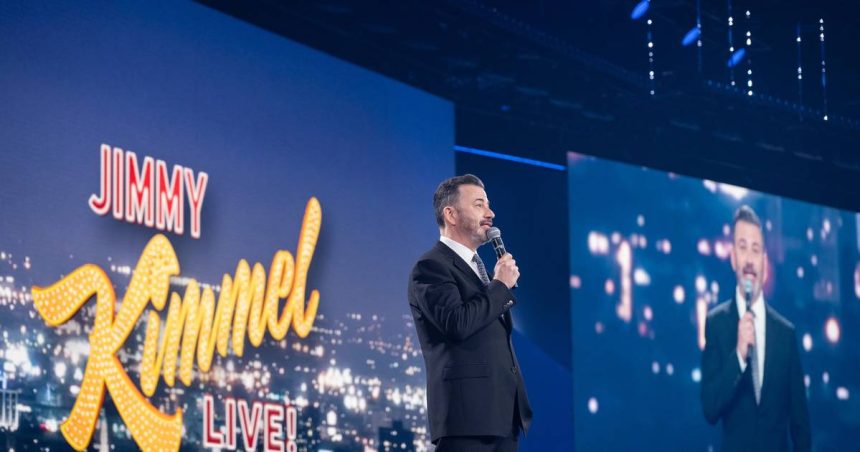Live musical numbers, a Steve Aoki DJ set, and jokes about the nearly 50-year age gap between University of North Carolina at Chapel Hill head football coach Bill Belichick and his girlfriend Jordon Hudson. The 2025 upfronts season really had it all.
This year, there was also plenty of uncertainty. With fears of an economic downturn casting a figurative (and sometimes literal) rain cloud over the week, media execs were tasked with reassuring an industry expecting an ad spend slowdown that their precious dollars would be well spent—and could be adjusted—if entrusted to them.
Ryan Gould, president of ad sales and client partnerships at Warner Bros. Discovery (WBD), told advertisers to “rest assured” that deals would be negotiated under “fully flexible” agreements; ad sales chief Rita Ferro said the company “is committed to being that strategic partner you can count on for flexibility and value.” Donna Speciale, president of ad sales and marketing at TelevisaUnivision, echoed similar sentiments to the Hollywood Reporter.
“[Marketers] want flexibility only because of the unknown, and the upfront gives them the flexibility,” Speciale said.
While each company had its own approach to pitching advertisers, some other common themes seemed to run through the presentations, which wrapped last week.
Keeping it simple—kind of: Throughout the week, media companies pitched simplifying things for ad buyers, and there are efforts to do the same in streaming—or at least to try to make the branding less confusing.
After Venu Sports, the attempted joint streaming service between WBD, ESPN, and Fox fell through, Fox and Disney are striking out on their own with streaming services. Disney’s upfront highlighted the streaming app aimed at centralizing ESPN programming in one place, which will be known as just “ESPN.” Ferro said the offering would allow subscribers to access all of ESPN’s programming plus additional features “all in one place.”
(Late-night host Jimmy Kimmel ribbed Disney for the choice, considering that it already operates an existing sports streaming service, ESPN+. “Will I get more content on ESPN+ than I do on ESPN?” he quipped onstage. “No. You will get less content on ESPN+. The plus is now, in many ways, a minus.”)
Ahead of its upfront, Fox revealed the name of its own streaming service set to launch in the fall: Fox One will combine various Fox programming, including Fox News, as well as Fox Sports programming like fall football, when it debuts later this year.
Last but not least, WBD revisited its somewhat baffling choice to drop the name of its cable crown jewel from its streaming service Max. A few years after the rebrand, the platform has reversed course and will reembrace “HBO Max.”
Get marketing news you’ll actually want to read
Marketing Brew informs marketing pros of the latest on brand strategy, social media, and ad tech via our weekday newsletter, virtual events, marketing conferences, and digital guides.
The sports, of course: Throughout upfronts week, media companies also seemed to want to get one message across: no, we have the most (or the best) sports. NBCUniversal talked up its rights to future NBA games and the 2026 World Cup, while Disney CEO Bob Iger boasted that the company has “the most live sports hours in the industry.” Fox highlighted its rights to the Indianapolis 500 along with its slate of NFL games, and WBD, fresh off losing the NBA, hyped up tennis and NCAA basketball.
For companies with fewer total hours of sports, there was a focus on quality: NFL commissioner Roger Goodell made pit stops at both Netflix’s and YouTube’s upfront presentations to highlight the few games that the streaming services have locked down rights to.
Would an upfront be an upfront without athletes onstage? At Disney, Peyton and Eli Manning sang a (dismally off-key) song, while Amazon trotted out the Kelce brothers. At Fox, Tom Brady whiffed a pass so badly that it hit an audience member.
Do it live: It’s not just live sports that streaming services want advertisers to buy into. NBCU touted an upcoming live Wicked special, which will feature Ariana Grande and Cynthia Erivo crooning tunes at the Peacock Theater in LA ahead of the sequel’s theatrical release. And fresh off SNL 50th anniversary celebrations in February, the company teased its 100-year celebration in 2026, which will include plenty of live programming.
At TelevisaUnivision, which operates the streaming service ViX, the company introduced YAFest, a televised and livestreamed Coachellaesque music festival that will run in three cities in September 2026. And at Netflix, execs wanted advertisers to get excited about other live programming, including a revival of the talent competition series Star Search, reimagined as a live competition series complete with audience voting.
Vintage appeal: Some streaming services used upfronts week to dress up old offerings. NBCU had Versant, the new name of Comcast’s cable assets that are being spun off into a new company, which advertisers can keep buying through NBCU’s platform for the next two years.
WBD, meanwhile, trotted out Storyverse, a new offering for its content portfolio that, according to a press release, “recapture[s] the magic of the original IP through a branded lens” by allowing brands to tap into movies, TV series, and franchises from over the years.
Read the full article here









